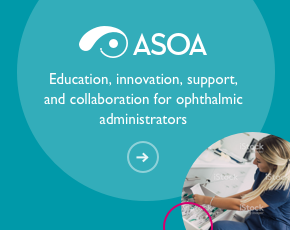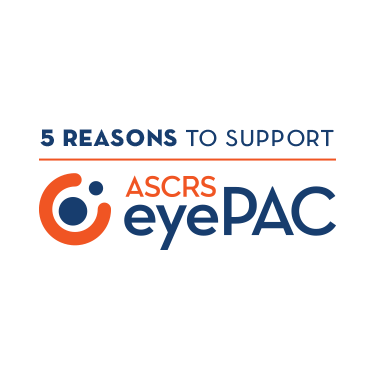Tele-Ophthalmology
Introduction to Tele-Ophthalmology
Expanded Medicare telehealth coverage enables beneficiaries to receive a wider range of healthcare services from their doctors without having to travel to a healthcare facility. ASCRS and ASOA have prepared a guide to starting your practice on the tele-ophthalmology path. Learn more
Webinar: Updated: Implementing Tele-Ophthalmology During the COVID-19 Pandemic
Recent government action has expanded telehealth coverage for Medicare beneficiaries nationwide, temporarily waiving penalties for HIPAA violations, and will reimburse physicians for telehealth services at the same rate for face-to-face services. CMS recently announced additional policies, including Medicare coverage for telephone services, and significant additions to the list of covered telehealth services, such as emergency visits. ASCRS and ASOA recognize that our members need resources on how to implement telemedicine visits for their practices and patients. Watch the webinar replay.
Physician Relief Provisions in the CARES Act
Coronavirus Aid, Relief, and Economic Security (CARES) Act – Key Physician – Related Provisions
ASCRS and the surgical community lobbied for specific provisions included within the CARES Act that provides relief for ASCRS members and their practices. The key physician-related provisions are highlighted in the ASCRS/ASOA Phase III document.
In addition, the congressional staff prepared an FAQ document on the CARES Act.
Advance Payment Program
CMS Announcement of Expansion of Accelerated and Advance Payment Program
On March 28th, CMS announced an expansion of its accelerated and advance payment program for Medicare participating providers and suppliers due to the financial hardships and challenges providers are facing as a result of the COVID-19 pandemic. CMS specifically highlights the disruption to the health care industry, including the delay of non-essential surgeries and procedures and the disruption to billing.
Accelerated and advance Medicare payments, which are typically offered in natural disasters, provide emergency funding and addresses cash flow issues based on historical payments when there is a disruption in claims submission and/or claims processing. Due to the pandemic, CMS is expanding the program for all Medicare providers throughout the country during this public health emergency. The payments can be requested by hospitals, doctors, durable medical equipment suppliers and other Medicare Part A and Part B providers and suppliers. Learn more.
Medicare's COVID-19 Advanced Payment Program: Frequently Asked Questions
As a result of the quick rollout of the program, there are many questions regarding the procedure to apply for and obtain the funds, as well as the timeline and specifics for recoupment.
Recently, the AMA met with CMS senior officials to raise these questions. Here are the answers provided by CMS. We will continue to work with the AMA, the medical community, and CMS to improve the program – including extending the timelines and waiving the interest if loan not recouped in 210 days.
WEBINAR - MEDICARE’s COVID-19 Advance Payment Program: Frequently Asked Questions
The CARES Act provided the Centers for Medicare and Medicaid Services (CMS) with expanded authority to make available advance payments to physicians to assist during the COVID-19 emergency. As a result of the quick rollout of the program, there are many questions regarding the procedure to apply for and obtain the funds, as well as the timeline and specifics for recoupment. Recently, the AMA met with CMS senior officials to raise these questions, many of them provided to the AMA by ASCRS and ASOA. Join Nancey McCann, ASCRS Director of Government Relations, for a review of the answers. Watch the webinar replay.
Public Health Emergency Fund Grants
HHS Clarifies Terms and Conditions of Emergency Fund Grants; Providers are Eligible for Grants – Even if You are Not Directly Providing Care to COVID-19 Patients
After ASCRS, the AMA and other medical organizations raised concerns when the initial HHS Emergency Fund grants were released that, in agreeing to the terms and conditions of the grants, physicians were being required to attest that they diagnose, treat, or test patients for COVID-19, HHS has now modified some of the language to make its meaning more clear, stating that every patient is a possible case of COVID-19. Providers are eligible, even if they are not directly providing care to COVID-19 patients.
The website at CARES Act Provider Relief Fund now includes the following statement:
If you ceased operation as a result of the COVID-19 pandemic, you are still eligible to receive funds so long as you provided diagnoses, testing, or care for individuals with possible or actual cases of COVID-19. Care does not have to be specific to treating COVID-19. HHS broadly views every patient as a possible case of COVID-19.
Also, the second provision of the Terms and Conditions has been changed to no longer say providers attest to "currently" taking care of patients, just that they did so after 1/31/2020:
The Recipient certifies that it billed Medicare in 2019; provides or provided after January 31, 2020 diagnoses, testing, or care for individuals with possible or actual cases of COVID-19; is not currently terminated from participation in Medicare; is not currently excluded from participation in Medicare, Medicaid, and other Federal health care programs; and does not currently have Medicare billing privileges revoked.
Provider Relief Fund Payment Attestation Portal Now Open
The CARES Act Provider Relief Fund Payment Attestation Portal is now open. Providers who have been allocated a payment from the initial $30 billion general distribution must sign an attestation confirming receipt of the funds and agree to the terms and conditions within 30 days of payment.
The portal has a variety of steps, including confirmation of eligibility, billing TINs, verifying payment information, attestations (likely related to the Terms and Conditions), and confirmation.
As a reminder, HHS' payment of this first round of payments is conditioned on the healthcare provider's acceptance of the Terms and Conditions, which acceptance must occur within 30 days of receipt of payment. Not returning the payment within 30 days of receipt will be viewed as acceptance of the Terms and Conditions. The portal will guide providers through the attestation process to accept or reject the funds.
Verifying Eligibility for Payment and Contact Information
Since last Friday when HHS announced it would begin disbursing the first $30 million of the emergency fund created under the Coronavirus Aid, Relief, and Economic Security (CARES) Act to physicians and other providers via direct payment, there have been questions about how to verify eligibility for payment and who to contact when a physician believes they are eligible but did not receive a payment. HHS partnered with UnitedHealth Group (UHG) to deliver the stimulus payments, and physicians should contact UHG’s Provider Relations at 866-569-3522 about eligibility, whether a payment has been issued, and where it was sent. Note, if a physician or practice did not already set up direct deposit through CMS or UHG’s Optum Pay, they will receive a check at a later date. Practices that would like to set up direct deposit now can call the UHG Provider Relations number.
Paycheck Protection Program (PPP)
Department of the Treasury Guidance Regarding the Paycheck Protection Program (PPP)
Department of Treasury information fact sheet on the PPP, which authorizes up to $349 billion in forgivable loans to small businesses to pay their employees during the pandemic.
Quality Reporting/MIPS
CMS Delays 2019 MIPS Submission Deadline to April 30, 2020, Adds Hardship Exception for COVID-19; Provides Relief for 2019 Fourth Quarter ASC Quality Reporting
On March 22, 2020, CMS announced it would extend the deadline to submit 2019 MIPS data until April 30, 2020. In addition, CMS created a new extreme and uncontrollable circumstances hardship policy so that any physician or group who fails to report 2019 MIPS data by April 30, 2020 will receive a neutral payment adjustment in 2021. CMS is also evaluating options for providing relief for the 2020 MIPS performance year.
Physicians who have not submitted any MIPS data by April 30, 2020 do not need to take any additional action to qualify for the automatic extreme and uncontrollable circumstances policy. These clinicians will be automatically identified and receive a neutral payment adjustment for the 2021 MIPS payment year. All four MIPS performance categories for these clinicians will be weighted at zero percent, resulting in a score equal to the performance threshold, and a neutral MIPS payment adjustment for the 2021 MIPS payment year. However, if a MIPS eligible clinician submits data on two or more MIPS performance categories, they will be scored and receive a 2021 MIPS payment adjustment based on their 2019 MIPS final score. Learn more.
First Coronavirus Response Act (FFCRA)
Paid Sick and Family Leave Tax Credits – FAQ’s
The US Department of the Treasury and the IRS released guidance for small and mid-size employers regarding refundable tax credits that reimburse them for the cost of providing their employees paid sick and family leave wages related to COVID-19. The Families First Coronavirus Response Act (FFCRA) gives businesses with fewer than 500 employees funds to provide employees with paid sick leave and family and medical leave related to the pandemic.
- Eligible employers can receive a credit in the full amount of the qualified sick leave and family leave wages paid for between April 1, 2020 and December 31, 2020.
- Employers can be reimbursed immediately by reducing their federal employment tax deposits. If there are insufficient federal employment taxes to cover the amount of the credits, employers may request an accelerated payment from the IRS
Read more information on small and mid-size business tax credits for paid sick and family leave.


